10 Life-Changing Poems That Will Change Your Perspective on Life
Life-Changing Poems
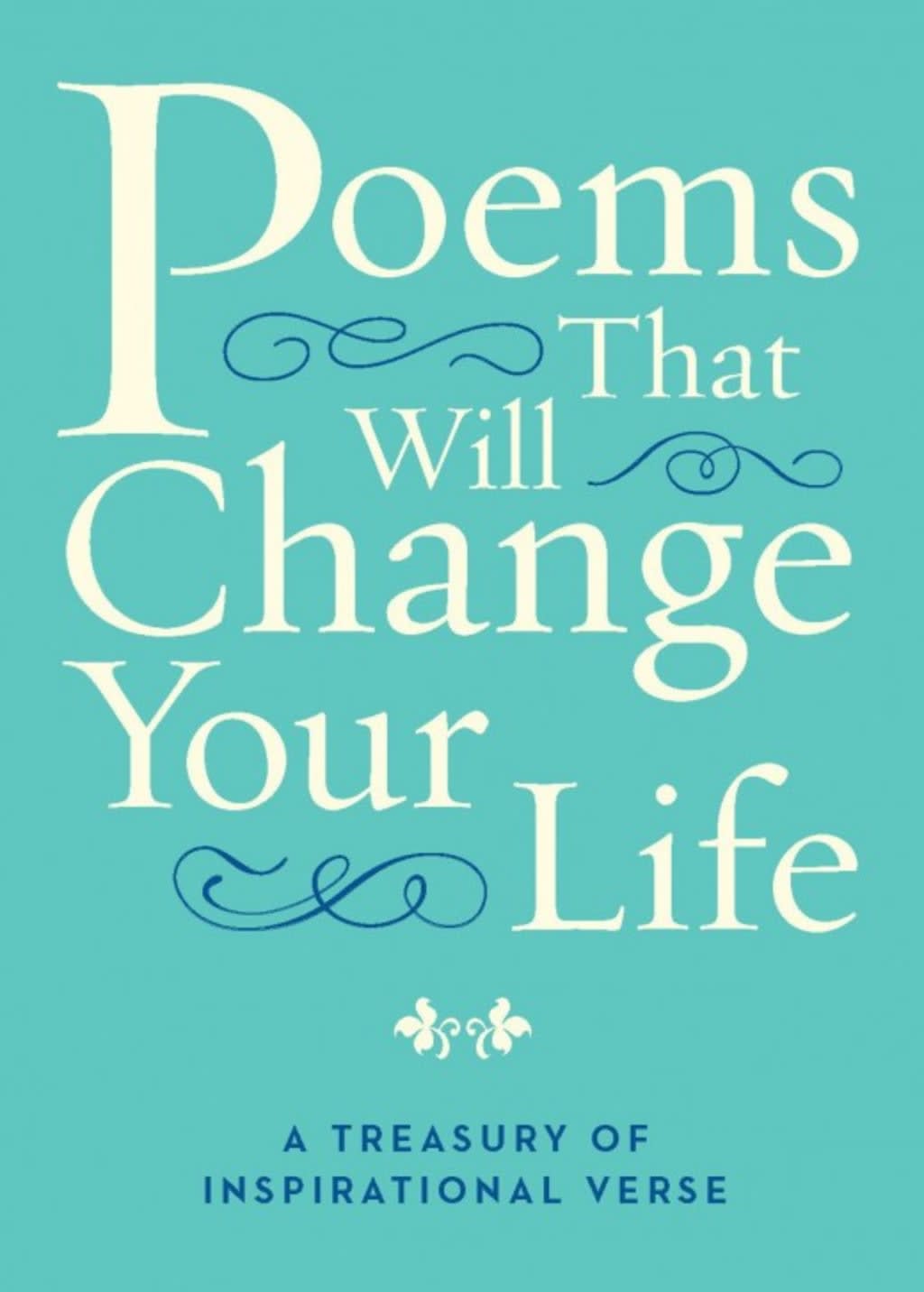
How Can A Poem Change The Perception of living?
Can poems change our life? Our joy and happiness in life usually depend on contemplating people and things around us. No matter who we are, what we’ve gone through, or what we own, it’s our perception of the world that determines our peace of mind. With these 10 poems, you may make positive eternal changes to your life by realizing that you’re the only person that affects your well-being. In your darkest moments, when your heart feels tender and broken wide open, I hope you’ll turn to the wisdom of the poets. A good poem can act as a balm for your soul as well as prepare you for the truths you’ll rediscover at this time.
Through the inspiration of these ten famous poets' fantastic own words, these poems who have been a great challenge to select the cause of the multitude of talented poets will show you how the power of some words and rhymes could inspire you to survive what you all the time knew deep inside yourself but never had the right simple words to express it. Poetry needs to change life and these texts will speak to your souls.
When most people set out to change their lives, they often focus on all the external stuff, like a new job or a new location or new friends or a new romantic prospects and on and on. But the reality is that changing your life starts with changing the way you see everything in your life. So here, I’ve collected 10 life-changing poems — the best poems that can change your mind and life. Are you ready to change? Enjoy great poems about life-changing below. Hope you have beautiful moments on Rhymings.
“What Life Should Be” By Pat A. Fleming
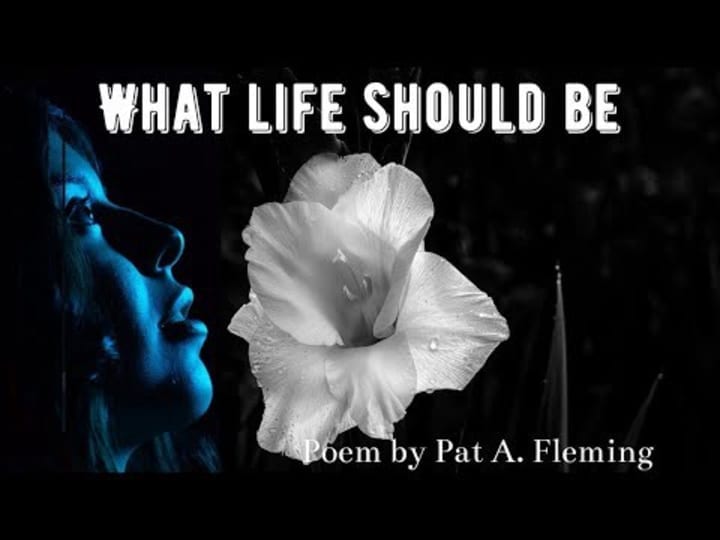
Stepping away from the famous and classic works, we find this gem of a poem by an amateur writer (just goes to show that anyone can create pieces of great meaning). This poem pushes me to remind myself of what life is supposed to be. It’s so easy to get lost and discouraged in life but then one little moment, a smile exchanged, a call from a friend, a touch when you’re sad, can change your heart completely and make you realize that it’s all very simple really. It’s so easy to make it complicated for ourselves when all we have to do is live a life of love and understanding and everything else falls into place. It’s simple, yet inspiring.
To learn while still a child
What this life is meant to be.
To know it goes beyond myself,
It’s so much more than me.
To overcome the tragedies,
To survive the hardest times.
To face those moments filled with pain,
And still, manage to be kind.
To fight for those who can’t themselves,
To always share my light.
With those who wander in the dark,
To love with all my might.
To still stand up with courage,
Though standing on my own.
To still get up and face each day,
Even when I feel alone.
To try to understand the ones
That no one cares to know.
And make them feel some value
When the world has let them go.
To be an anchor, strong and true,
That person loyal to the end.
To be a constant source of hope
To my family and my friends.
To live a life of decency,
To share my heart and soul.
To always say I’m sorry
When I’ve harmed both friend and foe.
To be proud of whom I’ve tried to be,
And this life I chose to live.
To make the most of every day
By giving all I have to give.
To me, that’s what this life should be,
To me, that’s what it’s for.
To take what God has given me
And make it so much more
To live a life that matters,
To be someone of great worth.
To love and be loved in return
And make my mark on Earth.
If — By Rudyard Kipling
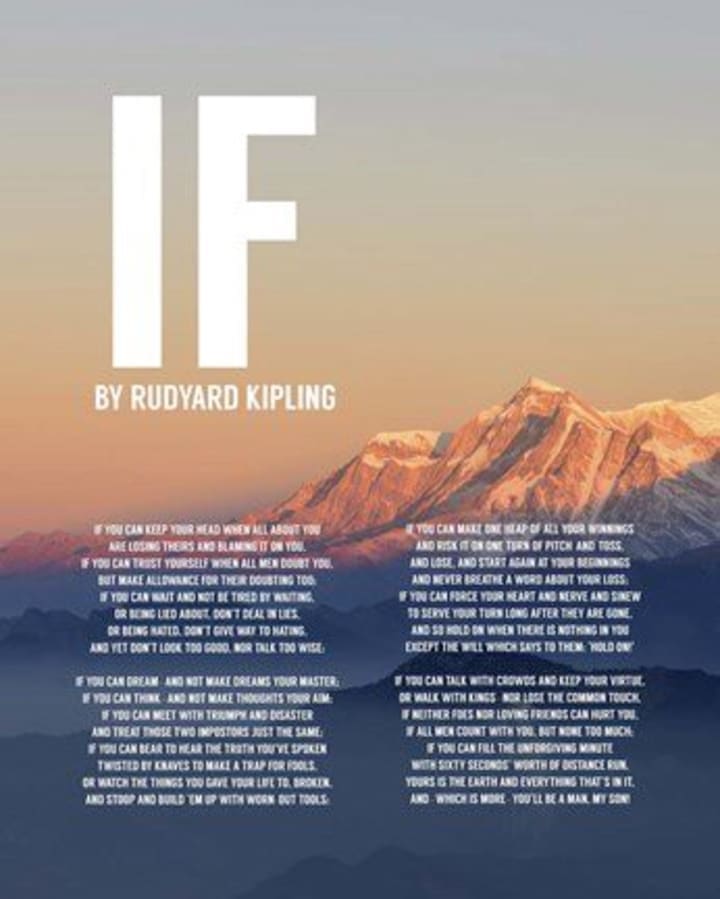
Life will challenge you — physically, mentally, emotionally, and spiritually. This poem calls out for you to endure, keep going through, and rise above the adversity you will face. It inspires, it motivates, it provides an example to follow. It’s like a recipe for life — and it provides a most satisfying meal. It is an inspirational poem that provides advice on how one should live one’s life. The poem takes the reader through various ways in which the reader can rise above adversity that will almost certainly be thrown one’s way at some point in one’s lives. The poet conveys his ideas about how to win this life, and after all, how to be a good human being. Risks must be taken into life and hopes must not be lost if things do not work out as the desired way. Eventually, the poet implied once people have reached success which they aimed at, they should remain to mingle with the common crowd but never lose his individuality.
If you can keep your head when all about you
Are losing theirs and blaming it on you,
If you can trust yourself when all men doubt you,
But make allowance for their doubting too;
If you can wait and not be tired by waiting,
Or being lied about, don’t deal in lies,
Or being hated, don’t give way to hating,
And yet don’t look too good, nor talk too wise:
If you can dream — and not make dreams your master;
If you can think — and not make thoughts your aim;
If you can meet with Triumph and Disaster
And treat those two impostors just the same;
If you can bear to hear the truth you’ve spoken
Twisted by knaves to make a trap for fools,
Or watch the things you gave your life to, broken,
And stoop and build ’em up with worn-out tools:
If you can make one heap of all your winnings
And risk it on one turn of pitch-and-toss,
And lose, and start again at your beginnings
And never breathe a word about your loss;
If you can force your heart and nerve and sinew
To serve your turn long after they are gone,
And so hold on when there is nothing in you
Except the Will which says to them: ‘Hold on!’
If you can talk with crowds and keep your virtue,
Or walk with Kings — nor lose the common touch,
If neither foes nor loving friends can hurt you,
If all men count with you, but none too much;
If you can fill the unforgiving minute
With sixty seconds’ worth of distance run,
Yours is the Earth and everything that’s in it,
And — which is more — you’ll be a Man, my son!
The Road Not Taken By Robert Frost
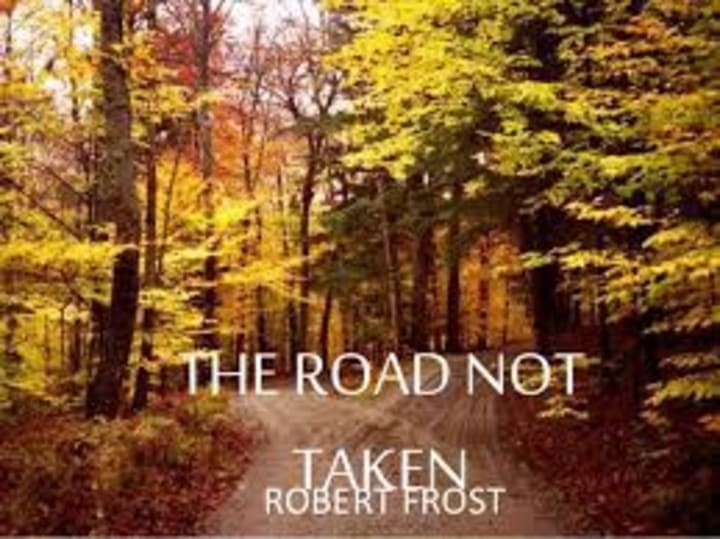
Life is made up of a succession of choices. This famous poem begins at a fork in a wooded path and ushers the reader along one “road” as a means of explaining that we must choose one way or another and not dilly-dally in life. No matter which way we go, we cannot foresee where it will take us, nor how the other would have turned out. We can do our best to make good decisions, but we’ll never truly know how much worse or better an alternative might have been. And so, we mustn’t regret the road not taken. The Road Not Taken” is an ambiguous poem that allows the reader to think about choices in life, whether to go with the mainstream or go it alone. If life is a journey, this poem highlights those times in life when a decision has to be made. The speaker spends a while deliberating when he comes to a fork in the road, which symbolizes a choice he must make in his life.
Two roads diverged in a yellow wood,
And sorry I could not travel both
And be one traveler, long I stood
And looked down one as far as I could
To where it bent in the undergrowth;
Then took the other, as just as fair,
And having perhaps the better claim,
Because it was grassy and wanted wear;
Though as for that the passing there
Had worn them really about the same,
And both that morning equally lay
In leaves, no step had trodden black.
Oh, I kept the first for another day!
Yet knowing how way leads on to way,
I doubted if I should ever come back.
I shall be telling this with a sigh
Somewhere ages and ages hence:
Two roads diverged in a wood, and I —
I took the one less traveled by,
And that has made all the difference.
A Psalm of Life By Henry Wadsworth Longfellow
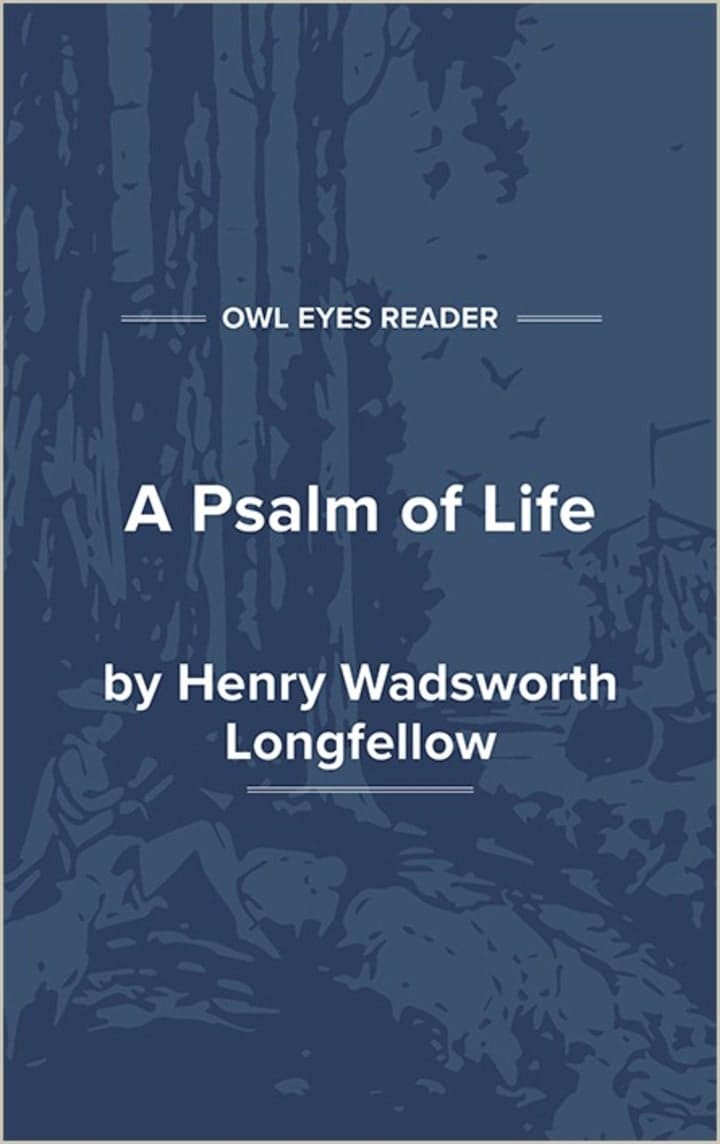
This rhyming poem is the spark that can reignite the fires within you. It challenges you to go out and live your life in the present moment as a “hero” and leave your mark on this world. “A Psalm of Life” by Henry Wadsworth Longfellow describes the purpose of life, and how one should handle the sorrow and struggles along the way. Throughout the poem, he intends to encourage the readers and urges them not to let the precious moments of life go in vain. He instructs them to keep a balance between happiness and sorrows and carve a better future for themselves. we should not spend our priceless moments sitting idly and doing nothing, rather we have to work hard towards reaching our goal and to make the most out of this short life.
Act! Take Action! Be Active!
Tell me not, in mournful numbers,
Life is but an empty dream!
For the soul is dead that slumbers,
And things are not what they seem.
Life is real! Life is earnest!
And the grave is not its goal;
Dust thou art, to dust returnest,
Was not spoken of the soul.
Not enjoyment, and not sorrow,
Is our destined end or way;
But to act, that each to-morrow
Find us farther than to-day.
Art is long, and Time is fleeting,
And our hearts, though stout and brave,
Still, like muffled drums, are beating
Funeral marches to the grave.
In the world’s broad field of battle,
In the bivouac of Life,
Be not like dumb, driven cattle!
Be a hero in the strife!
Trust no Future, however pleasant!
Let the dead Past bury its dead!
Act, — act in the living Present!
Heart within, and God o’erhead!
Lives of great men all remind us
We can make our lives sublime,
And, departing, leave behind us
Footprints on the sands of time;
Footprints, that perhaps another,
Sailing o’er life’s solemn main,
A forlorn and shipwrecked brother,
Seeing shall take heart again.
Let us, then, be up and doing,
With a heart for any fate;
Still achieving, still pursuing,
Learn to labor and to wait.
“Still I Rise” by Maya Angelou
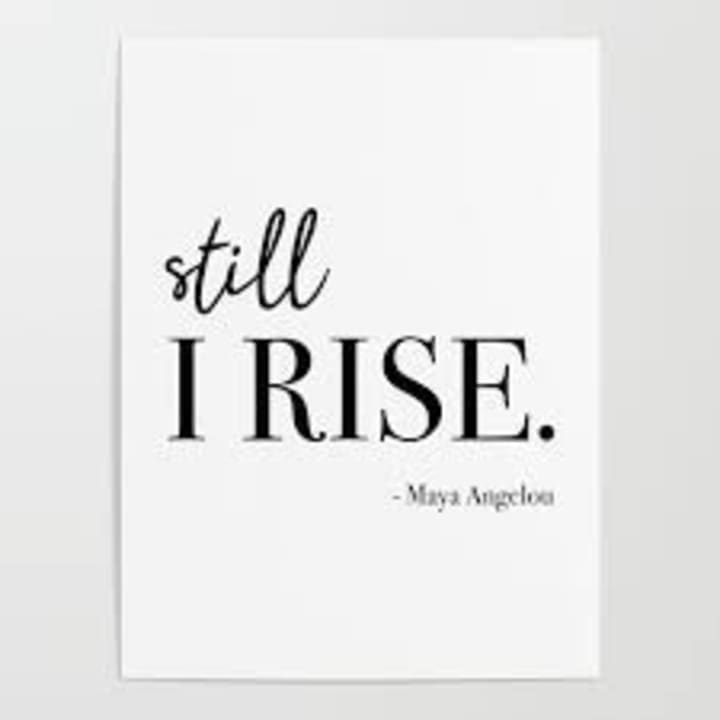
“The first time I read this poem I was still a young girl, trying to figure out who I was and frankly what the hell was happening to my body. Maya Angelou made me feel like who I was becoming — a woman — was something very special, ancient, and wonderful. I physically remember breathing out and sitting up just a little bit taller because of her words. “Still I Rise” is an empowering poem about the struggle to overcome prejudice and injustice. It is one of Maya Angelou’s most popular poems. When read by victims of wrongdoing, the poem becomes a kind of anthem, a beacon of hope for the oppressed and downtrodden. It is a reminder of the abuse of power by those who sit in government, the judiciary, the military, and the police force. For members of the public, it sends out the clear, repeated message of hope. No matter the circumstances, there must always be hope to cling to. Courage, pride, and injustice are some of the major themes crafted in the poem. The poet speaks about the biting criticism of dark skin in society. Also, she details how people want to kill them with hatefulness. But, the speaker is really proud of her identity, which she expresses in various ways in the text. She openly challenges those who want to hold her down. Instead of wallowing in stress and fear, she aims to live a happy and confident life.
You may write me down in history
With your bitter, twisted lies,
You may trod me in the very dirt
But still, like dust, I’ll rise.
Does my sassiness upset you?
Why are you beset with gloom?
’Cause I walk like I’ve got oil wells
Pumping in my living room.
Just like moons and like suns,
With the certainty of tides,
Just like hopes springing high,
Still, I’ll rise.
Did you want to see me broken?
Bowed head and lowered eyes?
Shoulders falling down like teardrops,
Weakened by my soulful cries?
Does my haughtiness offend you?
Don’t you take it awful hard
’Cause I laugh like I’ve got gold mines
Diggin’ in my own backyard.
You may shoot me with your words,
You may cut me with your eyes,
You may kill me with your hatefulness,
But still, like air, I’ll rise.
Does my sexiness upset you?
Does it come as a surprise
That I dance like I’ve got diamonds
At the meeting of my thighs?
Out of the huts of history’s shame
I rise
Up from a past that’s rooted in pain
I rise
I’m a black ocean, leaping and wide,
Welling and swelling I bear in the tide.
Leaving behind nights of terror and fear
I rise
Into a daybreak that’s wondrously clear
I rise
Bringing the gifts that my ancestors gave,
I am the dream and the hope of the slave.
I rise
I rise
I rise.
“What I Am” By Terrance Hayes
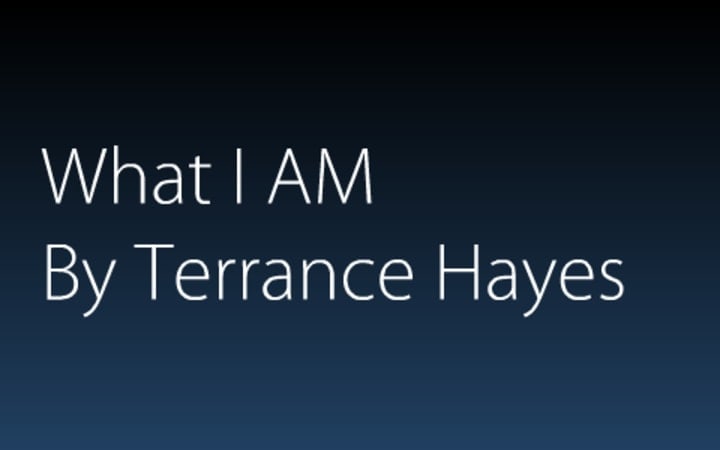
“This poem came into my life when I was having the most difficult time in college. This poem made me feel normal in its everydayness. In this poem, I was reminded that I am not an oddity, that life is as complicated as it is lovely, and just because the world around me may not know what I am, that doesn’t mean that I am not whole.”
Fred Sanford’s on at 12
& I’m standing in the express lane (cash only)
about to buy Head & Shoulders
the white people shampoo, no one knows
what I am. My name could be Lamont.
George Clinton wears colors like Toucan Sam,
the Froot Loop pelican. Follow your nose,
he says. But I have no nose, no mouth,
so you tell me what’s good, what’s god,
what’s funky. When I stop
by McDonald’s for a cheeseburger, no one
suspects what I am. I smile at Ronald’s poster,
perpetual grin behind the pissed-off, fly-girl
cashier I love. Where are my goddamn fries?
Ain’t I American? I never say, Niggaz
in my poems. My ancestors didn’t
emigrate. Why would anyone leave
their native land? I’m thinking about shooting
some hoop later on. I’ll dunk on every one
of those niggaz. They have no idea
what I am. I might be the next Jordan
god. They don’t know if Toni Morrison
is a woman or a man. Michael Jackson
is the biggest name in showbiz. Mamma se
Mamma sa mamma Ku sa, sang the Bushmen
in Africa. I’ll buy a Dimebag after the game,
me & Jody. He says, Fuck them white people
at work, Man. He was an All-American
in high school. He’s cool, but he doesn’t know
what I am, & so what. Fred Sanford’s on
in a few & I got the dandruff-free head
& shoulders of white people & a cheeseburger
belly & a Thriller CD & Nike high tops
& slavery’s dead & the TV’s my daddy —
You big Dummy!
Fred tells Lamont.
“The Guest House” By Jelaluddin Rumi, translated by Coleman Barks
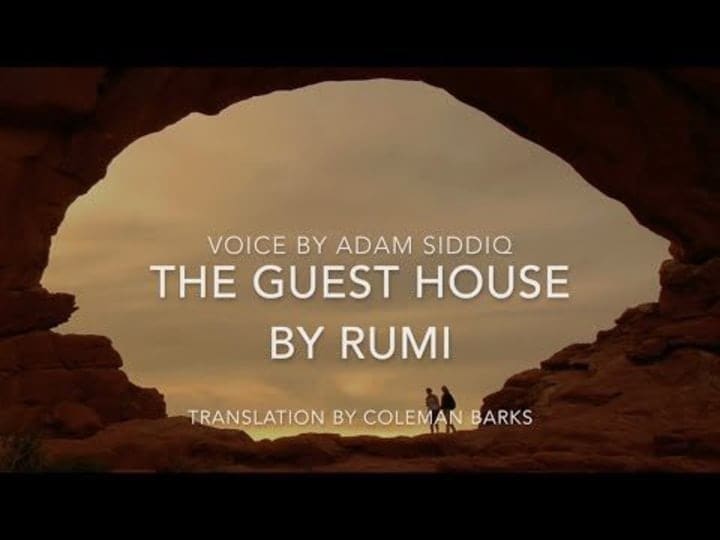
This poem helped me through that time and continues to resonate in my life today. I hope it brings peace to some else out there.” “A joy, a depression, a meanness, some momentary awareness comes as an unexpected visitor.” Rumi’s poem reveals the truth that being human is messy. Admit all feelings to the banquet of love or else they will destroy you by their insistence to be recognized, embraced, and admitted to full conscious awareness. Rumi validates my own life experience and inner knowing, reminding me to be grateful for all my inner family, the dark and the light, the shame and the triumphant spirit, the malice, and the generosity of spirit. In the Guest House Rumi is telling us that the entirety of the human experience is valuable. None of it is to be discounted as unnecessary or even avoidable. All emotions are valid and indeed desirable, even those we wish to evade. One moment is joyful, another is depressed, even meanness demands attention. Accept and honor them all, he says, because each portends a new state of being. Each is the portal to new awareness. Accepting each state is accepting the entirety of one’s being. The shadow and the light carry equal weight.
This being human is a guest house.
Every morning a new arrival.
A joy, a depression, a meanness,
some momentary awareness comes
as an unexpected visitor.
Welcome and entertain them all!
Even if they’re a crowd of sorrows,
who violently sweep your house
empty of its furniture,
still, treat each guest honorably.
He may be clearing you out
for some new delight.
The dark thought, the shame, the malice,
meet them at the door laughing,
and invite them in.
Be grateful for whoever comes,
because each has been sent
as a guide from beyond.
Hope’ is the thing with feathers By Emily Dickinson
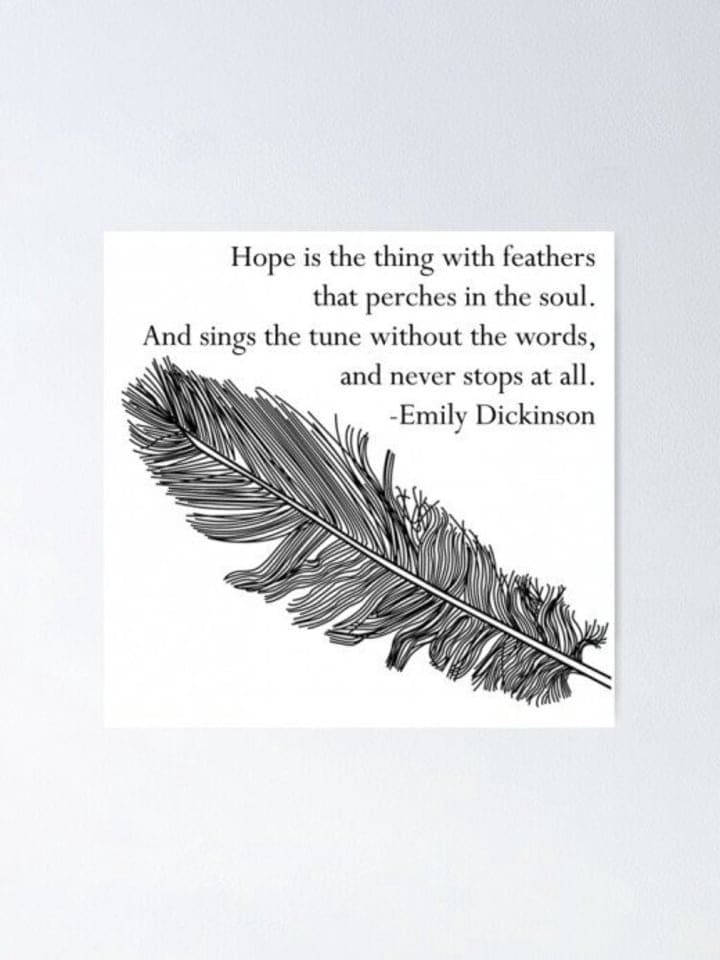
It’s just so pretty and simple and inspiring. I think this is a perfect example of something that sounds gorgeous while also meaning so much.” In the poem, “Hope” is metaphorically transformed into a strong-willed bird that lives within the human soul — and sings its song no matter what. Essentially, the poem seeks to remind readers of the power of hope and how little it requires of people. The speaker makes it clear that hope has been helpful in times of difficulty and has never asked for anything in return. “Hope is the Thing with Feathers” is one of a number of poems by Dickinson that breathes new life into an abstract concept by using surprising imagery and figurative language. This poetry however reflects a lively, imaginative, and dynamic inner world.
“Hope” is the thing with feathers -
That perches in the soul -
And sings the tune without the words -
And never stops — at all -
And sweetest — in the Gale — is heard -
And sore must be the storm -
That could abash the little Bird
That kept so many warm -
I’ve heard it in the chillest land -
And on the strangest Sea -
Yet — never — in Extremity,
It asked a crumb — of me.
THE TIDE RISES, THE TIDE FALLS BY HENRY WADSWORTH LONGFELLOW
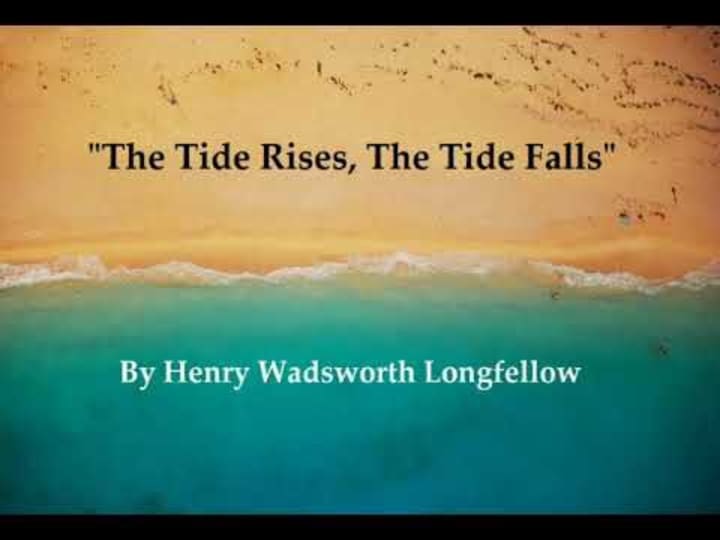
Much like “Rebirth,” this poem draws a parallel between nature and the cycle of life. The tide must rise and fall, as does the sun, as do we. This poem is a reminder that in darkness, we must trust that new light will come again. The poet presents the never-ending rise and fall of the tides in contrast with the finite journey of the traveler to show the mortality of life. The constant rise and fall of the tides emphasize the reoccurring cycle of life in the universe, where people are born, go through different phases of life, and then silently leave. Also, time washes away the spots of their existence. However, what stays in the minds of the readers is the impacts of the transience of life and eternity of the tides. The rising signifies the beginning of life, and the falling tides signify the end of mortal life. nature is indifferent to the life of humans and when a human dies, nature still continues its cyclical pattern. In this case, the loss or potential death of the traveler has no effect on the natural pattern of the tide.
The tide rises, the tide falls,
The twilight darkens, the curlew calls;
Along the sea-sands damp and brown
The traveler hastens toward the town,
And the tide rises, the tide falls.
Darkness settles on roofs and walls,
But the sea, the sea in the darkness calls;
The little waves, with their soft, white hands,
Efface the footprints in the sands,
And the tide rises, the tide falls.
The morning breaks; the steeds in their stalls
Stamp and neigh, as the hostler calls;
The day returns, but nevermore
Returns the traveler to the shore,
And the tide rises, the tide falls.
Annabel Lee By Edgar Allan Poe
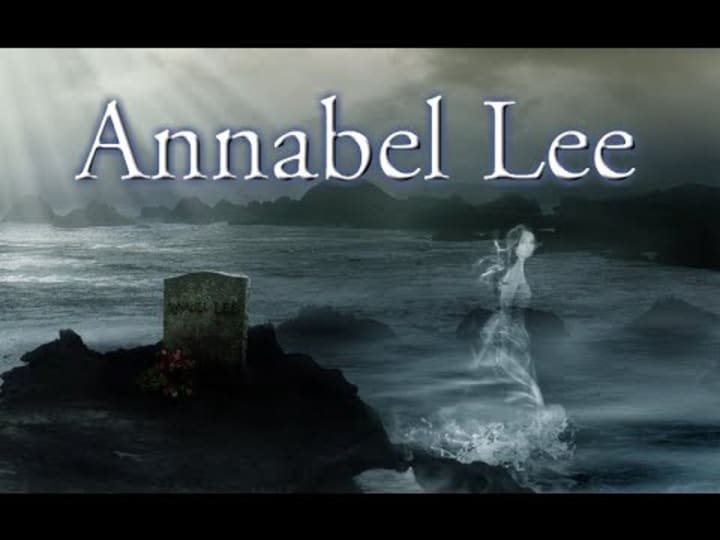
The poem is narrated by Annabel Lee’s lover, who forcefully rails against the people — and supernatural beings — who tried to get in the way of their love. Ultimately, the speaker claims that his bond with Annabel Lee was so strong that, even after her death, they are still together. It explores the depths of love and grief. The poem’s speaker is distraught over the loss of his lover, to the point that he spends his nights sleeping in her tomb. The poem deals with the subject of pure love that remains even after the person whom you love is gone. It also clarifies the role of nature that separates the speaker from his beloved. The popularity of the poem lies in the fact that it represents love in its most pure form. love is the greatest force present in the universe and no power can destroy it; not even death. Although his beloved leaves the mortal world, he feels her presence all the time.
It was many and many a year ago,
In a kingdom by the sea,
That a maiden there lived whom you may know
By the name of Annabel Lee;
And this maiden she lived with no other thought
Than to love and be loved by me.
I was a child and she was a child,
In this kingdom by the sea,
But we loved with a love that was more than love —
I and my Annabel Lee —
With a love that the wingèd seraphs of Heaven
Coveted her and me.
And this was the reason that, long ago,
In this kingdom by the sea,
A wind blew out of a cloud, chilling
My beautiful Annabel Lee;
So that her highborn kinsmen came
And bore her away from me,
To shut her up in a sepulcher
In this kingdom by the sea.
The angels, not half so happy in Heaven,
Went envying her and me —
Yes! — that was the reason (as all men know,
In this kingdom by the sea)
That the wind came out of the cloud by night,
Chilling and killing my Annabel Lee.
But our love it was stronger by far than the love
Of those who were older than we —
Of many far wiser than we —
And neither the angels in Heaven above
Nor the demons down under the sea
Can ever dissever my soul from the soul
Of the beautiful Annabel Lee;
For the moon never beams, without bringing me dreams
Of the beautiful Annabel Lee;
And the stars never rise, but I feel the bright eyes
Of the beautiful Annabel Lee;
And so, all the night-tide, I lie down by the side
Of my darling — my darling — my life and my bride,
In her sepulcher there by the sea —
In her tomb by the sounding sea.
Out, Out- By Robert Frost
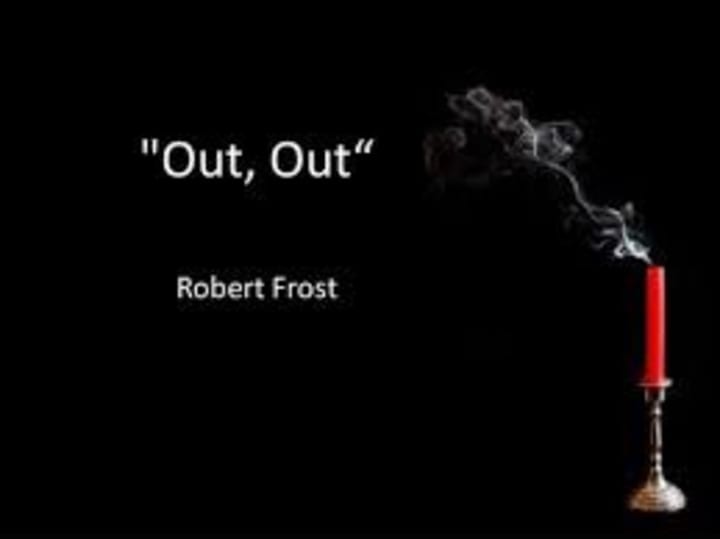
This poem is written by Robert Frost, a great American poet. The poem is about a young boy who loses his hand in an accident. The poem highlights what people feel about the young boy’s passing and also death. The poet used references from Shakespeare’s Macbeth to compare the unpreparedness and shock of death. Death, child labor, and the fragility of life are the major themes of this poem. Robert Frost has highlighted the issue of child labor in this short poem. Although the boy performs man’s tasks, he is still an innocent child at heart. The ending of the poem is callous, shocking, and cruel. People behave indifferently to the death of that boy. There are no signs of mourning or sadness on their faces. They return to their work as if nothing has happened. The message is the absurdity that is there in life. The beauty of life is also surrounded by similar cruelty. All of its end in the meaninglessness of death. This shows that life can be fast and quick like a candle, gone within a blink of an eye. When things go wrong such as death there is a time when your sad and devote your time to what has just happened but also you have to go on with your own lives and not let it interfere with what you have going on.
The buzz-saw snarled and rattled in the yard
And made dust and dropped stove-length sticks of wood,
Sweet-scented stuff when the breeze drew across it.
And from there those that lifted eyes could count
Five mountain ranges one behind the other
Under the sunset far into Vermont.
And the saw snarled and rattled, snarled and rattled,
As it ran light or had to bear a load.
And nothing happened: the day was all but done.
Call it a day, I wish they might have said
To please the boy by giving him the half-hour
That a boy counts so much when saved from work.
His sister stood beside him in her apron
To tell them ‘Supper.’ At the word, the saw,
As if to prove saws knew what supper meant,
Leaped out at the boy’s hand, or seemed to leap —
He must have given the hand. However, it was,
Neither refused the meeting. But the hand!
The boy’s first outcry was a rueful laugh,
As he swung toward them holding up the hand
Half in appeal, but half as if to keep
The life from spilling. Then the boy saw all —
Since he was old enough to know, big boy
Doing a man’s work, though a child at heart —
He saw all spoiled. ‘Don’t let him cut my hand off —
The doctor, when he comes. Don’t let him, sister!’
So. But the hand was gone already.
The doctor put him in the dark of ether.
He lay and puffed his lips out with his breath.
And then — the watcher at his pulse took fright.
No one believed. They listened at his heart.
Little — less — nothing! — and that ended it.
No more to build on there. And they, since they
Were not the one dead, turned to their affairs.
You cannot subscribe to yourself
About the Creator
Urooj Khan
I love writing about a life experience as well as topics that interest me.
Enjoyed the story? Support the Creator.
Subscribe for free to receive all their stories in your feed. You could also pledge your support or give them a one-off tip, letting them know you appreciate their work.






Comments
There are no comments for this story
Be the first to respond and start the conversation.